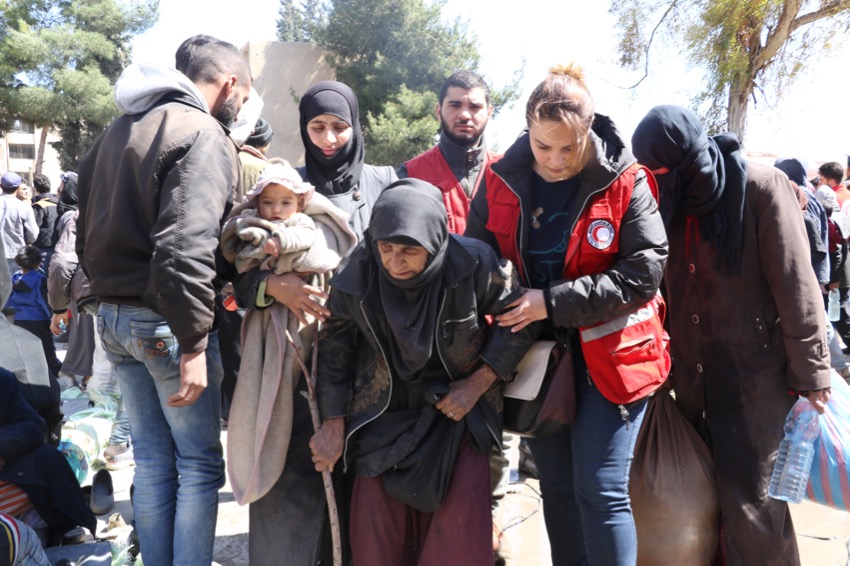Syria - a decade of mounting humanitarian needs
After a decade of conflict in Syria, the humanitarian situation remains dramatic, and millions of Syrians struggle to meet their basic needs on a daily basis. Across the country, a staggering 6 million people live in severe poverty, while 12.4 million have a hard time trying to put sufficient food on the table. With over half of all medical, as well as water and sanitation facilities not functioning properly, many Syrians lack access to essential and life-saving services. Furthermore, the security situation in the country continues to be critical; more than 2,000 civilian casualties were recorded due to attacks intentionally targeting civilians last year. A political solution is urgently needed to improve the lives of those most vulnerable to the ongoing hostilities, economic breakdown, and the COVID-19 pandemic.
“The people of Syria face huge, daily, challenges in accessing basic services. Rehabilitation of essential infrastructure is vital for their survival, allowing them to get back on their feet, to live with dignity and hope.” said Francesco Rocca, President of the International Federation of Red Cross and Red Crescent Societies (IFRC), when addressing the Ministerial Conference of the Syria Pledging Conference (Brussels V) on “Supporting the Future of Syria and the Region”. “Imposed sanctions have negatively affected humanitarian aid and its effectiveness. Sanctions are a major factor driving aid dependency, which adds pressure to the humanitarian response”, he added. “Aid alone will not resolve this crisis. The responsibility is on the parties to the conflict and their international supporters. There must be a political solution.”
With the cost of basic commodities more than doubling in the past 12 months, food insecurity is becoming an increasingly pressing issue and the number of Syrians dependent on food aid has skyrocketed. Millions of people who were once self-sufficient are now reliant on humanitarian assistance. The outbreak of COVID-19 and the resulting lockdown for several months has severely exacerbated the situation on the ground, with movement restrictions, job losses, and difficulties in accessing basic services at an all-time high. As underlined by Khaled Erksoussi, Secretary General of the Syrian Arab Red Crescent (SARC), during the conference’s Day of Dialogue with civil society: “After 10 years of the crisis, it is not acceptable that we help people in a hit-and-run way. We need more access in order to reach more people, understand their specific needs, and help them accordingly. Needs have increased following an economic downturn across the country, and we need to ensure an adequate material response.”

Inside Syria, SARC has been on the frontline of the humanitarian response to the crisis since the beginning of the conflict. With support from the International Red Cross and Red Crescent Movement, SARC volunteers have been providing aid, medical assistance and essential goods and services to millions of people, without consideration of their political, religious or ideological beliefs. They have often done so risking their own health and lives.
The EU and Member States can play a crucial role in brokering a sustainable political solution to alleviate the suffering in Syria and its neighbouring countries. They can also help to promote humanitarian principles and respect for International Humanitarian Law (IHL) by all parties to the conflict, in line with the ambitions outlined in the European Commission’s recent Communication on humanitarian action. In Syria, the safety of civilians is increasingly threatened by targeted assaults on civilian neighbourhoods, sexual and gender-based violence, as well as attacks on hospitals, health personnel and schools – prioritising their protection remains of utmost importance. Furthermore, humanitarian access in in the country has often been used by parties to the conflict as a commodity in political transactions or negotiations. This must stop. More must be done to ensure the safety of humanitarian actors and their access to affected populations.

Over the years, the consequences of the Syrian conflict have spread out to its neighbours in the Middle East and Europe. The situation of displaced Syrians and their host communities in countries such as Lebanon, Jordan, Egypt, Iraq and Turkey has become increasingly challenging. Around half of the population displaced by the Syrian conflict is abroad, and the overwhelming majority are hosted in neighbouring countries. In 2020, National Red Cross and Red Crescent Societies in the countries bordering Syria assisted over 3 million Syrian refugees and their host communities by supporting livelihoods, water and health systems, and ensuring that refugees can keep in touch with their loved ones. In the EU, Red Cross Societies have also been implementing a wide range of activities to enhance integration prospects, from offering psycho-social support programmes, to running reception centres, to facilitating reunification procedures with family members left behind.
The scale of the crisis still outstrips the collective humanitarian response. Continued financial support is key to addressing the acute humanitarian needs in the country and the wider region, as well as increased efforts to bridge the growing gap between needs and response capacity. After a decade of conflict, chaos and constant catastrophes that have been hitting innocent civilians the hardest, a political solution cannot come soon enough.
Overall, a total of EUR 5.3 billion was pledged by various actors to alleviate the crisis in the country and its neighbours, which is EUR 1.6 billion less than what was raised in the previous edition in 2020. It is critical that these funds are now quickly channelled to where they are most needed. In the meantime, the International Red Cross Red Crescent Movement will continue to support Syrians in need wherever they are.
For media inquiries, please contact Eva Oyón on: eva.oyon@redcross.eu or +32 2 235 09 22

